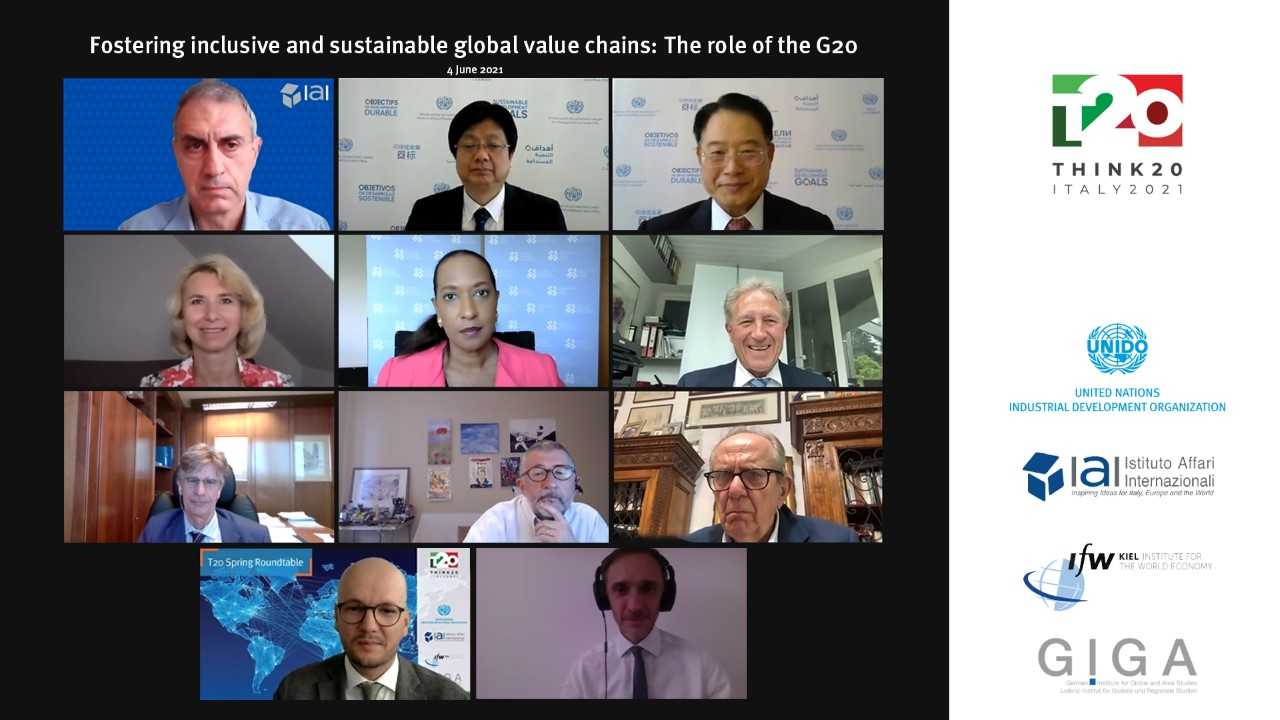Global value chains in the aftermath of the pandemic: what role for the G20?
04 June 2021

VIENNA, 4 June 2021 – Can embedding inclusive and sustainable transformation at the core of multilateral efforts help ensure that countries benefit from integration in global value chains (GVCs)? This was the question addressed by a stellar line-up of speakers brought together for a webinar organized by the United Nations Industrial Development Organization (UNIDO), together with the International Affairs Institute (IAI) and in cooperation with the Kiel Institute for the World Economy and the German Institute for Global Area Studies.
In the framework of the T20 Spring Roundtables, the virtual event brought together more than 200 participants worldwide. The discussion focused on inclusiveness and sustainability in global value chains in the aftermath of the coronavirus disruptions, and served as a platform to develop ideas and recommendations for the G20.
UNIDO’s Director General, LI Yong, said that to build back better, “we can stimulate inclusiveness by focusing our policy efforts on building state-of-the-art capabilities in small and medium-sized enterprises (…) and sustainability through smart regulation, including a new generation of trade and investment agreements.” Moreover, he stressed the need “to increase our joint efforts towards strengthening multilateral approaches to policymaking.
Pier Carlo Padoan, the Vice President of the IAI and T20 Italy Lead Co-Chair of Task Force 3: Trade, Investment and Growth, echoed the sentiment and brought the focus onto how we can strengthen the backbone of global value chains, and reaffirmed that “the G20 must retain its leadership in building up a new paradigm of sustainable growth,” despite the deep flaws and scars created by the coronavirus crisis in the current system.
“Making global supply chains fair and sustainable is a task in which policymakers and private enterprises have to engage,” said Norbert Barthle, Parliamentary State Secretary in Germany’s Federal Ministry for Economic Cooperation and Development. He said Germany’s Due Diligence Act is looking to address these challenges holistically by ensuring higher social standards in global value chains, leveling the playing field, and enhancing transparency in supply chains.
When looking at the playing field, buyers and suppliers find themselves in uneven positions, depending on the governance landscape. In this context, Beata Javorcik, Chief Economist of the European Bank for Reconstruction and Development (EBRD), underlined that “we need clear messaging about commitments to sustainability, we need to reduce information asymmetries,” as this will enhance the inclusiveness of global value chains, allowing for firms of all sizes to engage with and participate in global trade.
Diving deeper into global trade, Pamela Coke-Hamilton, the Executive Director of the International Trade Centre, highlighted the importance of ensuring transparency and predictability for greater participation of small and medium sized enterprises (SMEs) in global value chains. Coke-Hamilton said this can be achieved by mainstreaming and facilitating compliance with international standards, supporting innovation and digital technologies, and promoting sustainability.
Marco Felisati, Business 20 Sherpa and Confindustria’s Deputy Director of Internationalization and Trade Policy, echoed the panel’s view that “there is no trade-off between competitiveness and sustainability.” He highlighted that “on the contrary, complying with high sustainability factors is a competitiveness factor, and being competitive is a prerequisite for GVCs to be sustainable and inclusive.”
Mario Cimoli, Deputy to the Executive Secretary of the Economic Commission for Latin America and the Caribbean (ECLAC), reaffirmed that “manufacturing continues to be crucial.” He said in Latin America the pandemic has highlighted that manufacturing remains a key issue, as it is the only way “to expand industry, create diversification, and to sustain wages.”
As many countries are opening up again after a year of restrictions, speakers agreed that the time is now to look beyond the pandemic and focus on ensuring that global value chains become more inclusive and sustainable. The panel agreed that international coordination through multilateral bodies such as the G20 will be vital in moving forward.
For more information, please contact:
Adnan Seric
Research and Industrial Policy Officer, UNIDO